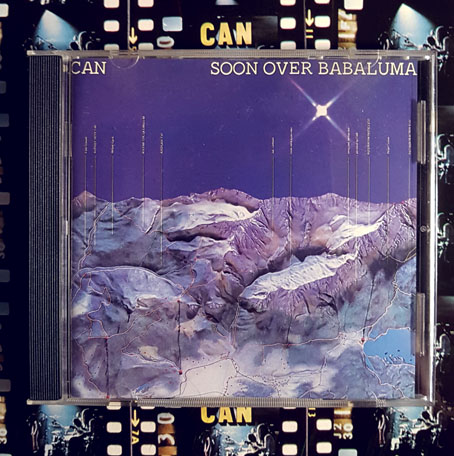
It’s never the same without the foil sleeve.
Since the death of Damo Suzuki I’ve been reading the Rob Young and Irmin Schmidt book about Can, All Gates Open. Can’s history isn’t exactly unfamiliar so it’s taken me a while to get round to it. I’ve been listening to their music for over 40 years, and bought the Can Box when it came out, a release which includes the Can Book, a substantial volume by Hildegard Schmidt and Wolf Kampmann containing career-spanning interviews with the core members of the group. Mysteries persist, however, so it’s been satisfying to have some of them resolved in the newer book, like the question of what exactly the title of the group’s sixth album, Soon Over Babaluma (1974) refers to. I’ve always liked this album, it was the second or third one I bought in 1981 when I found a secondhand copy of the original release in its shiny foil sleeve. Irmin Schmidt sings the words “Soon over Babaluma” on the second track, Come Sta, La Luna, a title which Young reveals as originating with Leonardo da Vinci. Then he has this to say:
Playfully extemporising from this text, Irmin cast his eyes across the studio to where Jaki’s girlfriend of the time, a woman called Christine, was perched on a sofa with accustomed stillness. “She had this really mysterious aura around her… She could sit there for hours like a cat not moving, or just drawing, or maybe doing nothing,” Irmin recalls. “So ‘Come sta, la luna’ was about Christine in a way. I’m talking about this girl who is going through walls. I don’t remember the words any more and I have never written it down. But there is something very spacey in the words—’Dancer on the rope, in the space’ or something. But when I wrote that, she was sitting in the studio and I was looking at her… I found her very mysterious and very beautiful.”
Almost by accident, the phrase “soon over Babaluma” emerged out of this stream of consciousness. “The word ‘Babaluma’ came out of a conversation with Jaki about the words. He maybe thought I had another word before, and he said, ‘What did you say? Babaluma?’ And because it rhymed with ‘luna’, it was a kind of playing with words—it didn’t mean anything. And it’s true surrealism. But the whole text is about something happening in space, out there. Seeing the moon and, from there, soon being over Babaluma—which must be another star or something. So it has another story behind it.”
So it was automatic writing after all. For a group whose compositions evolved out of endless improvisation this almost seems inevitable. Young makes a good argument for Soon Over Babaluma being Can’s cosmic album, made at a time when the kosmische idiom was peaking in Germany; even Kraftwerk were a little cosmic in 1973/74, with their Kohoutek-Kometenmelodie single being reworked for side 2 of Autobahn. There’s a lot of enlightening detail in All Gates Open, I recommend it. (Although I’m sure that’s a Stylophone solo on Moonshake, not a melodica as he seems to think.)
Meanwhile, Damo returns to the world this month with an official release for the Paris, 1973 concert. This one has circulated for years as a bootleg, and it’s a better showing by the band than some of the other recordings in the recent live series. More, please.
Previously on { feuilleton }
• Holger’s Radio Pictures
• Jaki Liebezeit times ten
• Can esoterics
• Can soundtracks
• Can’s Lost Tapes
